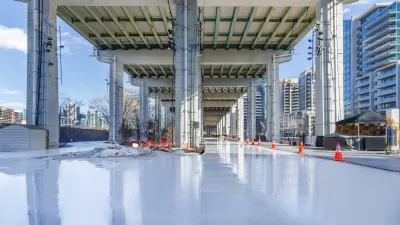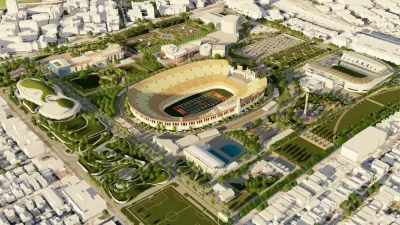A lack of funding prevents many U.S. parks and public spaces from playing a more significant role in helping residents meet daily needs.

A survey from Project for Public Spaces asked respondents to describe how they feel about their local public spaces and what amenities could make them better and more welcoming.
According to a Smart Cities Dive article by Rachel H. Pollack, the survey reveals that only 5 percent of respondents feel that public spaces are fully meeting community needs or letting residents easily and equitably “go outside, connect with neighbors and families and meet daily needs.” Respondents, some of whom were professionals from city planning and civic engineering, cited funding as a key factor impacting U.S. public space development and maintenance.
Interventions that improve public space can cater to the specific needs of each city, such as regional extreme weather events. “Cities can introduce new trees and awnings in public spaces to increase shade and combat rising temperatures, as in Phoenix, helping people better enjoy them. And they can design rain gardens and other green infrastructure in public spaces to help mitigate the effects of flooding, as New York City has done.”
FULL STORY: Public spaces could better meet community needs: survey

Maui's Vacation Rental Debate Turns Ugly
Verbal attacks, misinformation campaigns and fistfights plague a high-stakes debate to convert thousands of vacation rentals into long-term housing.

Planetizen Federal Action Tracker
A weekly monitor of how Trump’s orders and actions are impacting planners and planning in America.

In Urban Planning, AI Prompting Could be the New Design Thinking
Creativity has long been key to great urban design. What if we see AI as our new creative partner?

Portland Raises Parking Fees to Pay for Street Maintenance
The city is struggling to bridge a massive budget gap at the Bureau of Transportation, which largely depleted its reserves during the Civd-19 pandemic.

Spokane Mayor Introduces Housing Reforms Package
Mayor Lisa Brown’s proposals include deferring or waiving some development fees to encourage more affordable housing development.

Houston Mayor Kills Another Bike Lane
The mayor rejected a proposed bike lane in the Montrose district in keeping with his pledge to maintain car lanes.
Urban Design for Planners 1: Software Tools
This six-course series explores essential urban design concepts using open source software and equips planners with the tools they need to participate fully in the urban design process.
Planning for Universal Design
Learn the tools for implementing Universal Design in planning regulations.
Gallatin County Department of Planning & Community Development
Heyer Gruel & Associates PA
JM Goldson LLC
City of Camden Redevelopment Agency
City of Astoria
Transportation Research & Education Center (TREC) at Portland State University
Jefferson Parish Government
Camden Redevelopment Agency
City of Claremont





























